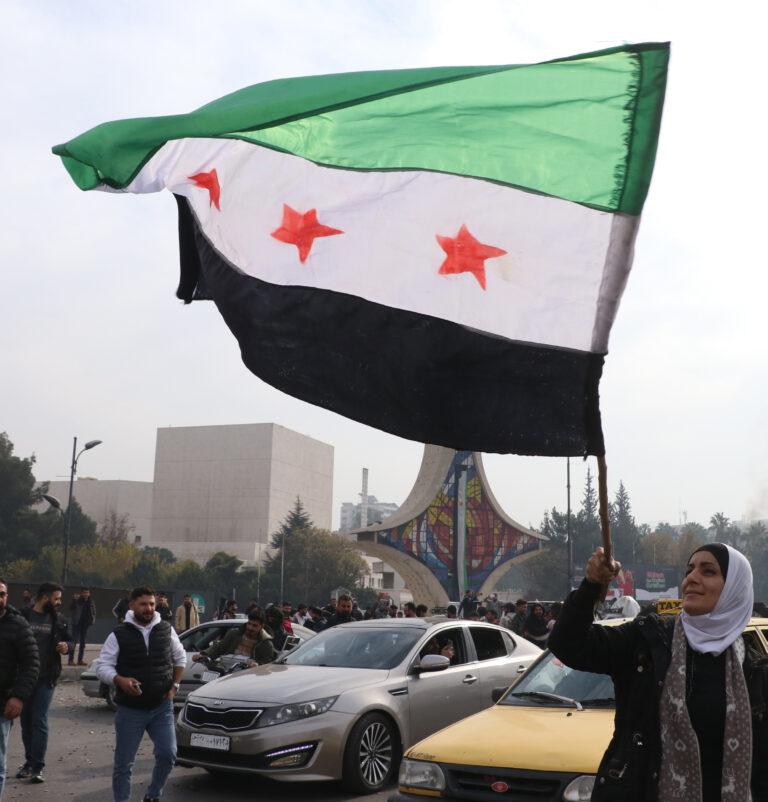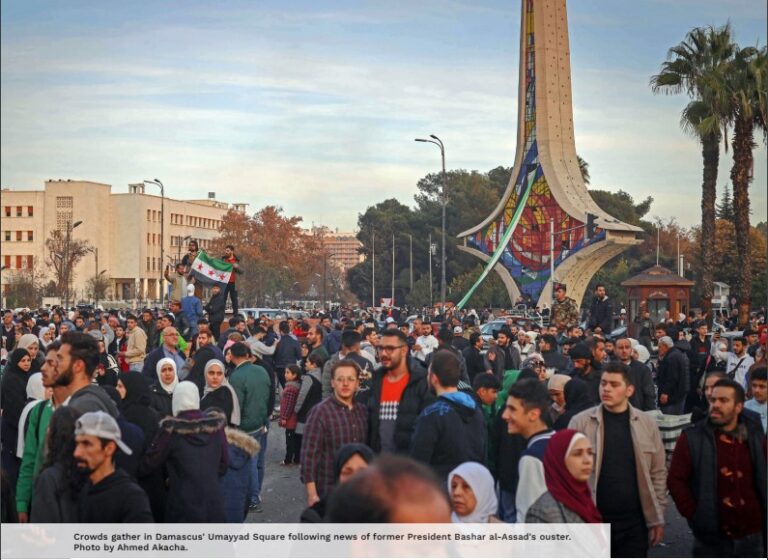In-Depth Analysis
On 16 August, the Syrian Ministry of Economy and Foreign Trade issued a six-month ban on the import of more than 20 commodities as part of a trade rationalisation scheme to protect dwindling reserves. Among the dizzying array of items prohibited under the ban are cell phones, residential air conditioners, construction materials (i.e., tiles, pipes, and stone), some vehicles, cheddar cheese, almonds, cashews, raisins, walnuts, and physiotherapy equipment. The Government of Syria’s key interest in issuing the order is reducing import expenditures to stabilise the exchange rate and save dwindling foreign reserves for essential imports. Arguably, Syria’s most critical and sensitive import is wheat. Unfortunately for Syria, efforts to prioritise domestic grain production have foundered (see: Syria Update 21 December 2020), and wheat prices have witnessed upward pressure in international trading this summer owing to global production shortfalls. The import ban therefore reflects food security concerns. It is also a leading indicator of challenges that loom before the Central Bank of Syria as the state scrambles to meet basic service needs. In the days leading up to the announcement, demonstrations broke out across Government of Syria areas, testifying to the public’s demands for improved basic services and substantive relief.
- On 5 August, demonstrators took to the streets in Masyaf, Hama Governorate, following further cuts to bread allocation. Dozens of local residents raised a banner that read, “We want to live”.
- On 13 August, unable to obtain their allocations of bread, residents of Deiruneh Jableh, Lattakia Governorate, blocked roads by burning tires. This occurred as the new smart card system came into effect, limiting each household to purchasing bread from a single, preselected bakery.
- On 14 August, demonstrations broke out in Um Dbeib and As-Sweida city, As-Sweida Governorate, over inadequate service provision (particularly water, electricity, and fuel). Protesters in As-Sweida city broke into the water directorate and seized two of its vehicles.
- On 15 August, protesters obstructed roads in Yahmur and Zarquat, Tartous Governorate, spurred on by a lack of drinking water and the contamination of water wells located adjacent to the local landfill.
- On 15 August, traders in Aleppo city’s Salhiyeh neighbourhood carried out a one-day strike in response to the deterioration of the economic situation and trade stagnation. The strike had been called two days earlier, but the city’s intense security measurements thwarted the first attempt.
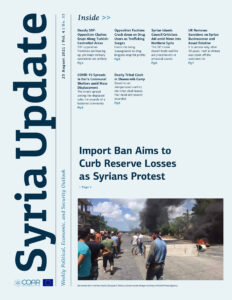
Protests targeting the Government of Syria are commonplace in the country’s northwest and northeast, but they are seldom seen and rarely tolerated in Government of Syria areas. Such demonstrations are especially rare in communities perceived as loyal to the Assad regime, such as Masyaf, Jableh, and Tartous. This has left pro-Government media in an awkward position. Media outlets formally affiliated with the Government of Syria have covered the protests, albeit while framing them as reactions to localised service-related issues brought on by obscure technical complications or the decisions of local officials. Even this is a concession to a wave of anger that signals to Damascus that blind affiliation in the absence of basic dignity is not guaranteed. In the main, however, officials continue to pin the blame for overall economic deterioration on Western sanctions and terrorism. Moreover, it is doubtful that protests can be backed up with the force of concrete action. Demonstrations such as these are unlikely to precipitate a large-scale popular uprising or even a coordinated nationwide protest movement, despite hopes to the contrary among the Syrian diaspora and their most ardent supporters in Western capitals.
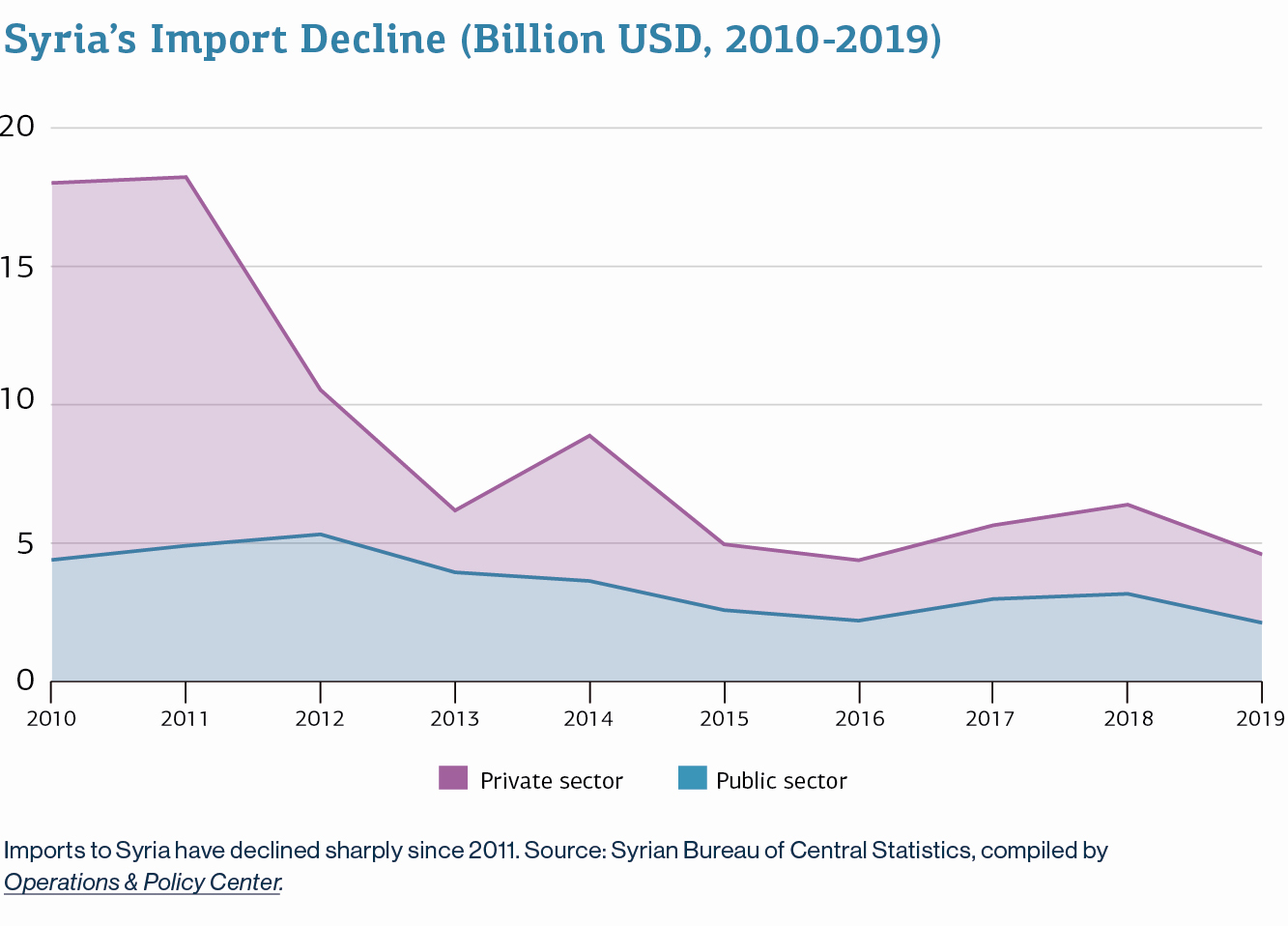
No nation is an island — except for Syria?
Diminished service capacity is among the consequences of Syria’s shrinking economy. A considerable reduction in foreign trade since 2011 has isolated Syria from once-key trading partners, forcing a protectionist shift and more conservative, localised patterns of foreign trade, as seen in official trade data visualised by the Operations & Policy Center. The import ban is therefore not a snap decision taken solely in response to a wave of public protest. It is part of a long-term decline in imports, brought on by trade complications, sanctions, and diminished fiscal capacity. For instance, the ministry’s latest import ban specifically targeted construction materials and goods that have locally produced substitutes; in 2020, the Government of Syria imposed a functionally identical ban on imports, similarly aimed at propping up domestic industry and shielding the reserves needed for currency stability and vital imports (see: Syria Update 26 May 2020). Such actions have inadvertent consequences. Although the recent decision may support local industries and labour and slow foreign currency reserve loss, it is also likely to increase the market prices of now-banned goods. If it does so, Syrian consumers will suffer as a result. Moreover, local production has seldom kept pace with demand, and supplies cannot be guaranteed. For instance, only two days after the Ministry of Industry declared a monopoly on the sale of bottled mineral water, the decision was reversed due to the Syrian Trade Corporation’s failure to cover needs. Syrians should, therefore, brace for shortfalls.
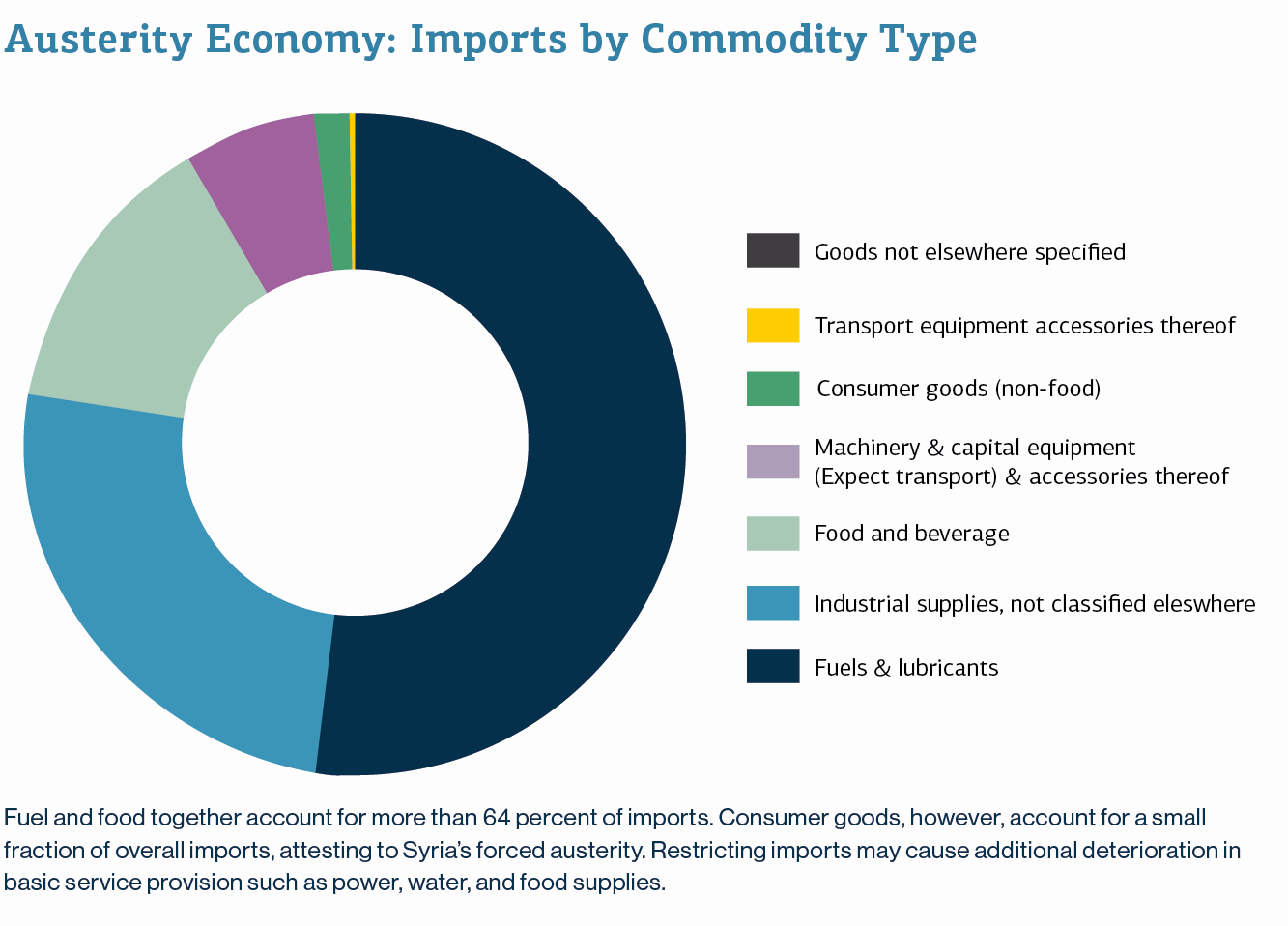
More laws, fewer solutions
Basic service crises have battered areas controlled by the Government of Syria, posing various national-level challenges. The persistent lack of services and diminishing livelihoods will undoubtedly fuel unrest and contribute to a groundswell of local anger. While tectonic shifts in Syria’s economic or political system are unlikely to follow from public outrage alone, important changes that are relevant for the aid response can be expected. Over time, the most notable shift has been Syrians’ increasing reliance on alternate service providers, in lieu of state support. The Government has done little to ameliorate harsh conditions; its shrinking capacity has left Syrians to seek support through remittance channels, civil society collectives, and NGOs. Shrinking state capacity is frequently read as an indicator of the Syrian regime’s weakness. Often, this is interpreted as a sign of its imminent collapse, or its notional receptiveness to Western demands. These are dubious propositions that willfully ignore the Assad regime’s willingness to prioritise its own survival while the population suffers. Instead, Western decision-makers should interpret public demonstrations and shrinking state capacity as signs of increasing need among the country’s most vulnerable. Unlike a grand political bargain over the country’s fate, basic needs can be shaped by foreign donors.
Whole of Syria Review
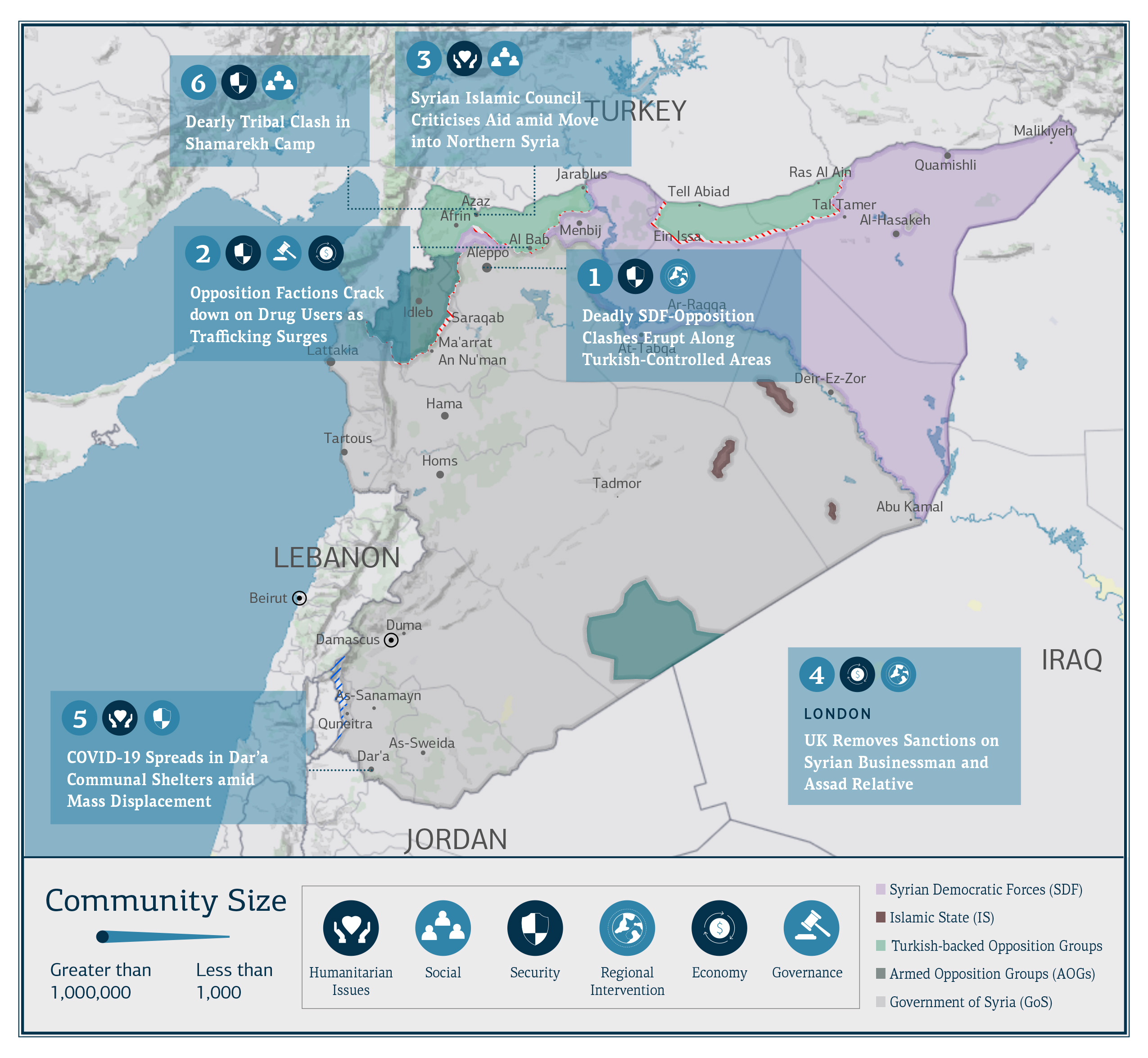
Deadly SDF-Opposition Clashes Erupt Along Turkish-Controlled Areas
Aleppo Province: On 14 August, media sources reported that Turkish forces and Turkish-backed Syrian opposition factions shelled several positions in Kurdish-held areas in the northern Aleppo countryside. The Afrin Liberation Forces, a pro-People’s Protection Units (YPG) insurgent group comprising Kurdish fighters from Afrin, targeted the sources of shelling — including the vicinity of the Afrin National Hospital — with mortars and heavy artillery. No casualties were reported on either side. On 15 August, media reported renewed shelling by Turkish forces based in the Olive Branch and Euphrates Shield areas against Syrian Democratic Forces (SDF) positions in the Afrin countryside. Government of Syria forces stationed in Jabal al-Sheikh Aqeel in the western Aleppo countryside targeted Turkish-backed opposition positions with tank and heavy machine gun fire. On 19 August, Syrian Civil Defence reported that a night-time missile attack on a village near Al-Bab had killed one woman and injured five civilians, including two women and a child. One day earlier, a shelling on residential neighbourhoods in Afrin city had killed three civilians and injured several others. Both attacks were reportedly launched from areas controlled by SDF and Government forces in the eastern countryside of Aleppo.
Sporadic clashes have also broken out between Turkish-backed opposition groups and Kurdish forces in northeast Syria. On 15 August, media sources reported that a member of the Turkish-backed opposition factions from Idleb was killed by an SDF sniper in the Peace Spring area, along the frontlines in northern Al-Hasakeh Governorate. This took place amid an exchange of shelling between Turkish and Turkish-backed opposition forces and the SDF in the countrysides of Al-Hasakeh and Ar-Raqqa. Two days later, a child was killed and six civilians were wounded as a result of shelling by Turkish-backed factions on Abu Rasin, east of Ras Al Ain in northern Al-Hasakeh Governorate. On 20 August, media sources reported that a Turkish drone bombed the headquarters of the Military Relations Office of the SDF-affiliated Tal Tamr Military Council during a meeting. A total of nine SDF members, including a female leader, were reportedly killed, and at least 10 others were wounded.
Heating up but far from boiling over
The frontlines between predominantly Kurdish forces and Turkish-backed opposition groups in northern Syria have heated up, yet the major military offensive that some aid actors fear does not yet appear likely. Worryingly, however, armed actors in the area are mobilising. Local sources have confirmed that opposition reinforcements, notably Jaysh al-Islam, have arrived in the Peace Spring area in Ras Al Ain, intensifying clashes and exchanges of shelling. Meanwhile, the Syrian Democratic Council has reportedly dispatched a delegation to continue long-running negotiations with the Government of Syria, although, as usual, there is no concrete information available concerning the talks. Decision-makers following Syria must note that the chaos engulfing Afghanistan amidst the U.S.’s abrupt withdrawal has undermined the resolve of local partners and increased pressure on U.S.-backed Kurdish forces to seek guarantees from Damascus, seen as a possible safeguard against a Turkish military offensive. Relatedly, local sources reported that attacks launched by the SDF or its affiliates in Afrin (an area with a historical Kurdish majority) may have been motivated by the return of a number of civilians to villages in the Afrin countryside, creating the impression that the area is safe for return. Such incidents demonstrate the continuing symbolic importance of Afrin following its military capture by Turkish-backed forces and the expulsion of tens of thousands of residents. Violent clashes between Kurdish forces and their Turkish-backed rivals in positions across northern Syria have flared periodically in recent years; there is a risk that the region is now primed to witness further line-testing as both sides seek to demonstrate their resolve.
Opposition Factions Crack down on Drug Users as Trafficking Surges
Al-Bab, Aleppo: On 13 August, media sources reported that Turkish-backed armed groups in northern Syria are increasing their efforts to combat narcotics trafficking amid a reported surge in drug use locally. The activity follows a July announcement by Ankara of a security campaign to root out the narcotics trade, in addition to targeting a host of antagonists including Islamic State (IS) cells and actors affiliated with the YPG and the Syrian Government (see: Syria Update 26 July 2021). As part of the campaign, on 26 July Turkish-backed forces arrested a drug smuggling ring leader, Samo Ammar, and affiliated gang members who sold narcotics in northern Aleppo. Earlier this month, military police in Al-Bab reportedly seized 100,000 narcotic pills in the city in a local bust. The chief anti-narcotics officer in Al-Bab has said that drug users in Turkish-controlled areas of northern Syria are subject to prison terms ranging from 5 to 10 years.
Syria’s protracted war on drugs
Northern Syria, like other parts of the country, is suffering from narcotics abuse, particularly among youth. To date, the Turkish-sponsored campaign to combat narcotics use in the region is likely the most stringent seen in any part of the country, yet attempts to curb the spread and use of narcotics have reportedly fallen short. Although narcotics production is a chief means of regime financing in Government-controlled areas of Syria, narco-trafficking has drawn greater attention in Turkish-controlled areas in recent months, particularly following high-profile drug interceptions by Turkish authorities (see: The Syrian Economy at War: Captagon, Hashish, and the Syrian Narco-State). Wide-reaching security campaigns are a response to domestic pressure in Turkey over fallout from the Syria crisis, but they will not uproot the trade itself, nor will harshly punitive drug policies stop use among Syrians. Above all, a stable environment is needed to support alternate economic opportunities. The Assad regime itself — believed to be the prime beneficiary of the drug industry in Syria — is unlikely to relinquish its profitable drug trade until it is able to secure viable alternatives. Drug use will be more easily addressed in the near and mid-term. Many Syrians have become habituated to stimulants like Captagon, which have been widely used as force multipliers in the past decade’s fighting. Substance use patterns built in combat have been difficult to shed even after fighters have demobilised, particularly due to widespread despair and the angst brought on by the miseries of life in a war-torn state. Drug treatment centres and mental health and psychosocial support (MHPSS) programming focused on substance abuse have already been considered in some areas of Syria. Activities such as these may be critical to providing alternatives to drug users, although punitive crackdowns by local armed groups will pose a distinct threat to any activities that cater to beneficiary populations treated as criminals.
Syrian Islamic Council Criticises Aid amid Move into Northern Syria
Azaz, Aleppo: On 5 August, a delegation from the Turkish-backed Syrian Islamic Council (SIC) visited Turkish-controlled areas of northern Syria. During the visit, the head of the SIC, Osama al-Rifai, gave a sermon in which he criticised the role of the UN and the aid sector for “diverting young people from their values and upbringings” and imposing Western values onto local communities, particularly through women’s empowerment programmes. The SIC also announced it will move its headquarters from Turkey to Azaz to begin playing a more active role locally. The group has sought wider relevance recently, including by congratulating the Taliban for “liberating Afghanistan from brutal occupiers” after its forces gained control of the majority of Afghan territory following the American withdrawal in early August.
Community acceptance
Touted as a moderate alternative to most conservative entities, the SIC is making a bid for greater political power and social prominence in northern Syria, a prospect that risks creating tension for aid implementers carrying out international donor prerogatives. Al-Rifai is well-respected among religious communities in Syria, and his critique of cookie-cutter aid interventions and the UN’s ignominious record in Syria resonate widely in the country. This may reinforce underlying assumptions about the international community’s involvement in the Syria conflict and its aspirations for the country’s post-war status. There is, of course, double-speak in al-Rifai’s messaging. Although the SIC has cheered on the revanchist Taliban, it stood alongside most of the Syrian opposition in calling for more robust Western — i.e. U.S. — military intervention in Syria through the creation of a no-fly zone. Moreover, its pleas for aid funding have not prevented its membership from singling out major donor states for critique. Donor state foreign policy should not be off-limits to criticism from any comer, but al-Rifai’s remarks inevitably raise questions for aid implementation in northern Syria. Relief works that are seen as conflicting with widely held conservative values, for instance MHPSS, women’s empowerment or livelihoods, and social cohesion activities, should be implemented with sensitivity to local conditions and underlying social mores. In order to reduce the risk of attracting unwanted attention, it is important to note that women’s empowerment programmes need not — and often should not — exclusively target women, whilst community engagement activities can be integrated into each phase of a programme to ensure that community perceptions are regularly tracked and accounted for. Mitigations such as these will likely be important to preventing unintended friction on contact with harsh realities in northern Syria.
UK Removes Sanctions on Syrian Businessman and Assad Relative
London: On 12 August, the United Kingdom’s Office of Financial Sanctions Implementation removed Syrian businessperson Tarif al-Akhras from its sanctions list. UK officials have not yet offered any justification for the manoeuvre, which essentially frees previously frozen assets of Syrian First Lady Asma al-Assad’s cousin. Al-Akhras was added to the EU’s (and UK’s) sanctions list in September 2011 due to his close ties to the Assad regime. Al-Akhras is generally believed to have offered financial and logistical support to Syrian Government military operations, although concrete evidence is apparently lacking. As the founder of Akhras Group, al-Akhras is involved in business operations across the country, including in commodities, trading, processing, and logistics, primarily in the food imports and construction sectors. In 2014, the UK’s High Court sentenced al-Akhras to 12 months in jail for contempt of court, after he breached a contract with Archer Daniels Midland for food imports to Syria.
It is notable that Al-Akhras was among the prominent businessmen whose assets in Syria were seized by the Syrian Ministry of Finance in December 2019 as part of a crackdown amidst the country’s economic crisis. Notably, Rami Makhlouf, al-Assad’s cousin and the country’s most influential businessman was targeted in the same crackdown. The purge was part of a high-profile publicity campaign aimed at burnishing the regime’s image domestically and internationally.
Back to business?
The UK did not specify the reason for the removal of sanctions on al-Akhras, who was the sole actor affected by the amendment, but it is likely that al-Akhras’s effective dismissal from key Syrian regime circles played a role. The impact of the decision is extremely difficult to assess. It is yet to be seen whether al-Akhras will attempt to repair international relations with Damascus, given his familial ties to the regime and useful business connections outside the country, including in the critical food and construction sectors. Although the parameters for operating in Government-controlled areas remain narrow, the recently implemented UN Security Council Resolution 2585 seemingly broadened the scope of permitted activities to include early recovery projects, and they were accompanied by pledges to facilitate food imports.
COVID-19 Spreads in Dar’a Communal Shelters amid Mass Displacement
Dar’a governorate: On 17 August, local and media sources reported that COVID-19 infections are spreading in shelters hosting people displaced from Dar’a al-Balad. According to local sources, around 31 people tested positive for COVID-19 last week; given limited testing, and many more of the more than 37,000 people who have displaced from the area (according to HNAP, as of 27 July) are presumed sick. A widely feared surge in cases is likely driven by overcrowding in the shelters, inadequate treatment options, and the inability to impose distancing. Following media reports indicating that there are dozens of infected people in Jasim in northern Dar’a, residents fear a spread of COVID-19.
Forgotten but not gone: COVID-19
The rising number of cases has repercussions for the challenging humanitarian situation in Dar’a Governorate. The high infection rates among IDPs from Dar’a al-Balad is a troubling indicator of conditions in the shelters and other centres that are ill-equipped to deal with the fallout from displacement as Government forces continue to pressure the former opposition fighters in Dar’a al-Balad. Restrictions on aid distribution, including the lack of permission to hand out food baskets, medical supplies, and sanitary equipment, exacerbate the situation. The displacement from Dar’a al-Balad is the largest inside Government-controlled areas since the outbreak of the COVID-19 pandemic, straining the capacity of Syria’s already overburdened, under-equipped health system. This failure is aggravated by the Government’s “see no evil” approach predicated largely on ignoring the pandemic (see: Syrian Public Health after COVID-19: Entry Points and Lessons Learned from the Pandemic Response). The instability of the situation in Dar’a Governorate, and the lack of an agreement to end the ongoing violence, increase the likelihood of further deterioration.
Dearly Tribal Clash in Shamarekh Camp
Azaz, Aleppo Governorate: On 4 August, media sources reported that four people were killed, and several injured, in the Shamarekh camp east of Azaz city in northern Aleppo as a result of a clash between the Jeis and Fardoun tribes. According to the report, the clash was instigated when a youth from the Jeis tribe opened fire on youths from the Fardoun tribe as they were breaking into the former’s tent.
Tribal tribulations
As local sources have indicated, clashes between Syrian tribes are common and can quickly erupt into violent episodes involving a large number of actors. When necessary, tribes are able to quickly mobilise kinsmen, which creates the potential for escalation of interpersonal disputes (see: Tribal Tribulations: Tribal Mapping and State Actor Influence in Northeastern Syria). For such reasons, it is important for implementers to bear in mind the lasting influence of tribal structures in Syria. As central state authorities and other conventional forms of social support erode, the patronage afforded by tribal networks is likely to grow in relative importance.
Open-Source Annex
Key Readings
The Open Source Annex highlights key media reports, research, and primary documents that are not examined in the Syria Update. For a continuously updated collection of such records, searchable by geography, theme, and conflict actor, and curated to meet the needs of decision-makers, please see COAR’s comprehensive online search platform, Alexandrina, at the link below..
Note: These records are solely the responsibility of their creators. COAR does not necessarily endorse — or confirm — the viewpoints expressed by these sources.
What Does It Say? The Palestinian embassy in Damascus announced that it would be issuing new, cheaper passports with no age restriction, that are faster to produce. Large numbers of Palestinian refugees have rushed to obtain one.
Reading Between the Lines: The deteriorating conditions in Syria have prompted many to consider emigrating by any means possible. Palestinians in Syria are no exception.
Government Prioritises Coastal Area in Regional Planning Scheme
What Does It Say? The Syrian Government is prioritising the coastal region for the implementation of its first regional planning scheme. The coast was reportedly chosen due to its abundance of natural resources.
Reading Between the Lines: How the areas will be prioritised for funding and planning may contribute to a continuing imbalance in resource allocation and attention from central authorities who have long privileged such communities.
Syria, Airpower, And The Future of Great-Power War
What Does It Say? During the conflict, Russian and American fighter jets regularly performed manoeuvres to prevent each other from bombing areas close to their bases or areas of main interest.
Reading Between the Lines: Such operations are the closest that “great-power” nations have come to direct conflict, holding out the possibility that Syria offers a template for future contests between major powers.
Pro-Iran militia muddles Iraq-Syria ties, sparks doubts about conference
What Does It Say? A disagreement has arisen between the Iraqi government and the Popular Mobilisation Forces (PMF) over the latter’s decision to invite the Syrian Government to the regional summit in Baghdad.
Reading Between the Lines: The Iraqi government has stated that it does not recognise any invitation sent to the Syrian Government. Syria’s position in regional politics is a tender subject. On the one hand, it is clear that it is the dominant power in Syria, and will retain its formal grip on the levers of state. On the other, the West categorically refuses to acknowledge it as a legitimate governing body, complicating matters for the conflicted Iraqi government.
Syria reports new Israeli missile attack
What Does It Say? A town near the Syrian-Israeli border was reportedly hit by Israeli missiles. No casualties were reported.
Reading Between the Lines: Recent Russian interception of Israeli missiles has contributed to the growing perception that Russia is changing its approach regarding Israeli attacks in Syria, potentially signaling a stronger stand against intervention from the south. A recalibration of the two countries’ relationship in Syria could have major implications.
What Does It Say? The Druze spiritual leader has expressed his support for the people of Dar’a.
Reading Between the Lines: This is the first time that Sheikh Hikmat al-Hajri has made such a statement, and it revives long-running speculation over the relationship between the two most important governorates in Syria’s south.
Al-Shaer: Assad sent an envoy to Washington and intends to escalate in southern Syria
What Does It Say? Reportedly, the Government of Syria has sent an envoy to the U.S. to restore diplomatic relations and is ready to accept all Western policies regarding the Middle East as long as the U.S. recognizes it as the sole legitimate ruler of Syria.
Reading Between the Lines: The last 10 years of conflict have been predicated on removing the current Syrian regime from power. There is almost no chance that the U.S. will recognise the Government of Syria as legitimate without vague, but substantial, preconditions being met.



